The Borderlands - The Plants

Plants as discussed by Dr. San Juana Mendoza include the Mesquite, Creosote, and Brickellia.
Mesquite
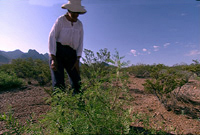
Dr. Mendoza claims that Mexicans have always recognized the usefulness of the Mesquite plant. In addition to its medicinal qualities, it is nutritionally rich in C and B Vitamins. It has protein and important amino acids. In addition, it also has a high content of glucose or sugar and has always been used as a food source during times of starvation.
View video: Dr. Mendoza talking about the Mesquite Plant.
Creosote
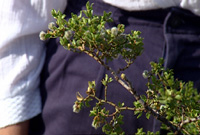
The Creosote bush has been used for centuries in the Southwest to cure fever, influenza, colds, upset stomach, gout, arthritis, sinusitis, anemia, and fungus infections. It acts as an antimicrobial agent and, therefore, is often used in first aid.
View video: Dr. Mendoza talking about the Creosote Bush.
Dr. Mendoza says that Mexicans value it for its antiseptic qualities. People often boil the plant in water and then use the "medicinal tea" on open wounds or cuts. They find that it promotes healing and helps with disinfection. It is often made into a salve for skin problems.
Creosote is often used daily for everything from diaper rash to stinky feet! Women often use the "tea" as a vaginal cleaner or to treat fungal and bacterial infections. Ranchers use it to keep flies away, especially when they butcher animals.
Brickellia Grandiflora
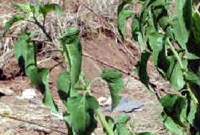
This plant is also called prodigiosa or jamula. It grows about one or two meters high in the wild areas of the Southwest borderlands. Dr. Mendoza says, "It is very efficient in lowering blood sugar levels and people can easily grow it themselves in pots in their homes and drink the herb fresh. It's good to make a little tea and drink it two or three times a day."
View video: Dr. Mendoza talks about the uses of the Brickellia Plant.
Three New Mexico State University Plants
Three plants from the Chihuahuan desert have shown positive anticancer results in initial testing at the Fred Hutchinson Cancer Research Institute in Seattle. They are Bear Berry, Jimson, Weedand Wild Mustard. These plants were gathered by New Mexico State University students. Further research continues with these species at the institute to see if they can be developed into modern drugs.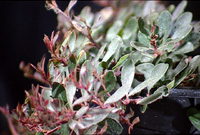
Bear Berry
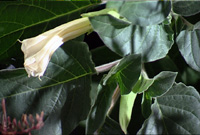
Jimson Weed
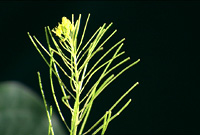
Wild Mustard
For more information about this website.
Contact the webmaster to report any problems with this site.
New Mexico State University is an equal opportunity/affirmative action employer and educator. NMSU and the U.S. Department of Agriculture cooperating.